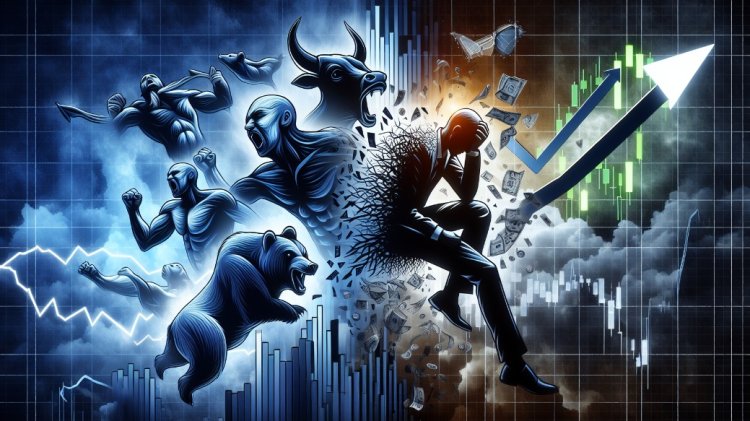The Psychological Factors Affecting Traders' Decision-Making in the Forex and Stock Market
Uncover the psychological factors that influence forex traders' decisions and how to master your own emotions for greater success in the stock market.

Introduction
-
The stock market is often compared to a giant casino, where traders are constantly buying and selling in the hopes of making money.
-
The main objective of traders is to make a profit. The desire to make more money is what drives them.
-
However, traders face immense emotional pressure due to the constant risks and uncertainties involved in the stock market.
The Human Factor in the Stock Market
-
Traders' decisions are influenced by hormones and emotions.
-
The role of neuroeconomics in studying traders' choices
-
Impact of irrational behaviour on the world economy
When it comes to the stock market, traders are not just making decisions based on logic and analysis. They are also subject to a variety of psychological influences, such as hormones and emotions. The constant risks and uncertainties of the stock market create immense emotional pressure for traders, which can greatly impact their decision-making process.
Neuroeconomics is a new science that allows us to study the choices made by traders and the role that hormones and emotions play in those choices. Psychologists like Daniel Kahneman's research has revealed that traders don't always make logical and consistent decisions. Instead, they frequently come under the influence of various psychological factors that affect how they perceive risk.
This irrational behaviour can have a significant impact on the world economy. The stock market is often compared to a giant casino, and when traders make irrational decisions, it can lead to market crashes and economic crises. The 2008 financial crisis, for example, was caused in part by the irrational behavior of traders who took excessive risks.
To prevent future crises, it is important to understand the human factor in the stock market. Traders need to be aware of how their hormones and emotions can impact their decision-making and take steps to manage these influences. Companies and trading firms must also create a culture that encourages rational decision-making and ensure that bonus structures are designed to reward responsible behaviour rather than excessive risk-taking.
Inside the Trading Room
-
An Overview of the London Stock Exchange
-
Daily transactions and high-tech trading rooms
-
Tension and uncertainty faced by traders
-
24/7 nature of the financial world
In the heart of the financial district known as the City, we find the London Stock Exchange, the first financial center in the world. Each day, millions of transactions occur in the high-tech trading rooms, where traders analyze stocks and monitor their portfolios for any opportunity to buy low and sell high.
The trading room may seem calm on the surface, but the tension is undeniable. Traders constantly face the pressure of making split-second decisions that can result in significant gains or losses. Every day brings new uncertainties, and even experienced traders like Darren Courtney Cook, the head of trading for Central Markets, admit that they never know what the market will give them.
One of the unique aspects of the financial world is its 24/7 nature. The New York market opens first, then the Asian markets, even though the London market may close for the day. Traders are constantly connected, monitoring prices and staying aware of market movements. The fast-paced nature of the financial world means that fortunes can change in an instant.
The Role of Rogue Traders
-
The collapse of major financial institutions in 2008
-
Stigmatisation of Rogue Traders
-
The human factor as a hidden part of the market frenzy
The 2008 financial crisis saw the collapse of major financial institutions and highlighted the role of rogue traders in contributing to the market frenzy. These individuals, like Jerome Kerviel of Societe Generale and Kweku Adoboli of UBS, became highly stigmatized for their excessive risk-taking and massive losses. Their names spread like wildfire in the international press, earning them the title of "rogue traders."
However, the actions of these traders illuminate a deeper issue within the financial industry: the human factor. Despite the presence of ultra-sophisticated computers and software programs, it is the human mind that remains at the centre of global finance. Traders are constantly under the influence of their emotions and psychological states, which can greatly impact their decision-making process.
Psychologists like Daniel Kahneman's research has revealed that traders don't always make logical and consistent decisions. Various psychological factors frequently have an impact on how they perceive risk. As the 2008 financial crisis showed, this irrational behaviour can have a significant impact on the global economy.
To prevent future crises, it is crucial to recognise the role of rogue traders and understand the human factor in the stock market. Traders need to be aware of how their hormones and emotions can impact their decision-making and take steps to manage these influences. Companies and trading firms must also create a culture that encourages rational decision-making and ensure that bonus structures are designed to reward responsible behaviour rather than excessive risk-taking.
The psychological factors in economic behaviour
-
Research by Daniel Kahneman on traders' decision-making
-
The importance of psychological factors in marketing and economics
-
Emergence of experimental economics
When it comes to economic behavior, numerous psychological factors play a significant role in decision-making. For example, traders in the stock market are not just making decisions based on logic and analysis. They are also influenced by a range of psychological factors, including hormones and emotions. The constant risks and uncertainties of the stock market create immense emotional pressure for traders, which can greatly impact their decision-making process.
Research conducted by psychologists like Daniel Kahneman has shown that traders do not always make consistent and logical decisions. Instead, they are often influenced by various psychological factors that affect their perception of risk. Kahneman's work has earned him the Nobel Prize in Economic Sciences in 2002, and his research has shed light on the importance of understanding the human factor in economic decision-making.
Psychological factors are also crucial in marketing and economics as a whole. Understanding consumer behaviour and motivations is essential for businesses to effectively sell their products and services. By recognising the psychological factors that influence consumer decision-making, companies can tailor their marketing strategies to better appeal to their target audience.
The emergence of experimental economics has further highlighted the role of psychological factors in economic behaviour. Experimental economists study the choices made by individuals in controlled environments to better understand how psychological factors impact economic decisions, particularly in financial markets. This field of study allows researchers to gain insights into the human factor in economic behaviour and develop strategies to mitigate irrational decision-making.
Experimental Economics: Understanding the Human Factor
-
The use of experimental economic laboratories
-
Impact of competition on trading behaviour
-
Role of risk appetite in decision-making
When it comes to economic behaviour, numerous psychological factors play a significant role in decision-making. For example, traders in the stock market are not just making decisions based on logic and analysis. They are also influenced by a range of psychological factors, including hormones and emotions. The constant risks and uncertainties of the stock market create immense emotional pressure for traders, which can greatly impact their decision-making process.
The use of experimental economic laboratories has allowed researchers to study the choices made by individuals in controlled environments. These labs simulate real-world trading scenarios and allow researchers to manipulate different variables to understand how psychological factors impact economic decisions, particularly in financial markets.
Impact of Competition on Trading Behaviour
One important aspect that experimental economics has shed light on is the impact of competition on trading behaviour. Studies have shown that when traders are placed in a competitive environment, they tend to take more risks and engage in speculative behaviour. The desire to outperform others and win bonuses can lead to irrational decision-making and a disregard for risk management.
Companies and trading firms need to recognise the influence of competition and create incentive structures that encourage responsible behaviour. Instead of rewarding excessive risk-taking, bonus structures should reward consistent performance and adherence to risk management strategies.
Role of Risk Appetite in Decision-Making
Another important factor that experimental economics has highlighted is the role of risk appetite in decision-making. Research has shown that individuals have varying levels of risk tolerance, and this can greatly impact their trading decisions. Some individuals may have a higher risk appetite and be more willing to take on greater risks, while others may have a lower risk appetite and prefer to avoid risky investments.
Understanding an individual's risk appetite is crucial for both traders and companies. Traders need to be aware of their own risk tolerance and develop strategies that align with their risk appetite. Companies and trading firms need to consider the risk preferences of their traders when assigning them to different portfolios or trading strategies.
In conclusion, experimental economics has provided valuable insights into the human factor in economic decision-making. By studying the choices made by individuals in controlled environments, researchers have been able to understand the impact of psychological factors on economic behaviour. This understanding is crucial for traders and companies to effectively navigate the stock market and make rational decisions that mitigate risks and promote responsible behaviour.
The Influence of Hormones and Emotions
-
Research on testosterone levels in financial traders
-
The link between testosterone and risk-taking behaviour
-
Effects of Dopamine and pleasure on decision-making
When it comes to trading in the stock market, hormones and emotions play a significant role in the decision-making process. Research has shown that hormone levels, such as testosterone, can greatly influence a trader's risk-taking behaviour.
Studies have found a correlation between high levels of testosterone and the tendency to take greater risks. Traders with higher testosterone levels are more likely to engage in speculative behaviour and make riskier decisions. This can lead to both substantial gains and losses in the stock market.
Furthermore, dopamine, often referred to as the pleasure chemical, also plays a role in decision-making. When traders experience success, such as winning a trade or making a profit, dopamine is released in the brain, creating a rush of pleasure. This pleasurable feeling can influence traders to continue taking risks and potentially lead to irrational decision-making.
Understanding the influence of hormones and emotions on traders' decision-making is crucial to managing risk and preventing market crashes. Traders need to be aware of how their hormone levels can impact their behaviour and decision-making process. Additionally, trading firms and companies should develop strategies and incentive structures that promote responsible decision-making and reward consistent performance rather than excessive risk-taking.
The Role of Stress and Fear
-
Impact of stress and fear on decision-making
-
Experiments on financial risk-taking under stress
-
Influence of the amygdala and anterior insula
When it comes to trading in the stock market, stress and fear play a significant role in the decision-making process. Traders are constantly under immense emotional pressure due to the risks and uncertainties involved in their work. This pressure can greatly impact their ability to make rational decisions.
Experiments in neuroeconomics have shed light on the impact of stress and fear on financial risk-taking. Researchers have found that individuals who are placed under stress are more likely to take greater risks. This is particularly evident in the stock market, where traders are constantly faced with high-pressure situations and split-second decision-making.
The amygdala is one part of the brain that experiences a lot of stress and fear. The amygdala is responsible for processing emotions, particularly fear and anxiety. When traders experience stress, the amygdala can become overactive, leading to impulsive and irrational decision-making.
Another area of the brain that is involved in the processing of stress and fear is the anterior insula. The anterior insula is responsible for the perception of physical and emotional states. When traders are under stress, the anterior insula can become hyperactive, leading to heightened emotional responses and potentially increasing the likelihood of risky behaviour.
Understanding the role of stress and fear in decision-making is crucial for traders and trading firms. Traders need to be aware of how their emotions can impact their decision-making process and take steps to manage these influences. Trading firms should also create a supportive and low-stress environment to promote rational decision-making among their traders.
The Brain's Decision-Making Process
-
Role of the dorsolateral prefrontal cortex in decision-making
-
Influence of reason and emotion on decision-making
-
Competition between emotional and analytical thinking
When it comes to trading in the stock market, the brain plays a crucial role in the decision-making process. Researchers have identified specific regions of the brain that are involved in decision-making, including the dorsolateral prefrontal cortex.
The dorsolateral prefrontal cortex is responsible for conscious decision-making and helps to override impulsive and emotional responses. It allows individuals to consider the consequences of their actions and make decisions based on reason rather than emotion.
However, the influence of reason and emotion on decision-making is a constant competition within the brain. Traders are not only driven by logical analysis, but they are also influenced by a range of psychological factors, including hormones and emotions.
Research has shown that traders often make decisions based on their emotions, such as fear of loss or the desire for gains. This can lead to irrational behaviour and risk-taking. On the other hand, traders also rely on analytical thinking to assess risks and potential rewards.
The competition between emotional and analytical thinking can greatly impact the decision-making process. Traders must find a balance between their emotions and reason to make informed and rational decisions in the stock market.
Understanding the brain's decision-making process is crucial for traders and trading firms. Traders need to be aware of how their emotions can influence their decision-making and take steps to manage these influences. Companies and trading firms should also create a supportive and low-stress environment that encourages rational decision-making and discourages excessive risk-taking.
Improving traders' performance and market culture
-
The importance of training traders to handle emotions
-
There is a need for changes in the trading floor culture.
-
Reevaluation of bonus structures
Improving traders' performance and market culture is essential to preventing market crashes and economic crises caused by irrational behaviour and excessive risk-taking. Traders need to be trained to handle their emotions effectively, as psychological factors such as hormones and emotions have a significant impact on their decision-making process.
Training programs should focus on helping traders understand how their emotions can influence their decision-making and teach them strategies to manage these influences. By learning techniques to control emotions and make rational decisions, traders will be better equipped to navigate the constant risks and uncertainties of the stock market.
In addition to training, changes in the trading floor culture are necessary to promote rational decision-making. Companies and trading firms should create an environment that encourages open communication, collaboration, and responsible behaviour. By fostering a culture that values rational decision-making and discourages excessive risk-taking, traders will be more likely to make informed and calculated decisions.
Furthermore, it is crucial to reevaluate bonus structures within the industry. Instead of rewarding excessive risk-taking, bonus structures should be designed to reward consistent performance and adherence to risk management strategies. By aligning incentives with responsible behaviour, trading firms can create a more sustainable and stable market culture.
Overall, improving traders' performance and market culture requires a holistic approach that includes training, changes in the trading floor culture, and reevaluation of bonus structures. By addressing these factors, the stock market can become a more rational and stable environment, reducing the risk of market crashes and economic crises.
Conclusion
-
Potential for another global financial crisis
-
The necessity of regulation and changes in the market
-
Role of neuroeconomics in shaping market theory
The stock market, with its constant risks and uncertainties, is susceptible to another global financial crisis. Traders face immense emotional pressure in this high-stakes environment, which can greatly impact their decision-making process. The 2008 financial crisis served as evidence that traders' irrational behaviour contributes to market crashes and economic crises.
To prevent future crises, regulation and changes in the market are necessary. Traders need to be aware of how their hormones and emotions can impact their decision-making and take steps to manage these influences. Companies and trading firms must also create a culture that encourages rational decision-making and discourages excessive risk-taking. Bonus structures should be reevaluated to reward responsible behaviour rather than excessive risk-taking.
Neuroeconomics, a new science that studies the choices made by traders and the role of hormones and emotions in those choices, is instrumental in shaping market theory. Understanding the human factor in economic decision-making is crucial for traders and companies to effectively navigate the stock market and make rational decisions that mitigate risks and promote responsible behaviour.
If you don't want to go through the stress of Forex but want to make money, join our Forex Managed Account Programme (links below).
TradeFxP Features
If you choose to be a self-employed retail trader, here are a few things we offer:
-
The best trading platform
-
No Requotes
-
Lowest Spreads
-
High-level liquidity
-
Interbank connectivity
-
Pure STP/DMA/ECN
-
Free signals
-
Best support
-
Crypto Wallet and withdrawals and deposits (USDT)
-
Robust CRM
-
TradeFxP wallet
-
Once you click withdrawal
-
Multiple payment options
-
Local offices to walk into
-
Free VPS
-
Free video chat and virtual meetings
-
And many more...
If you choose to be a part of our managed account program,
-
All of the above +
-
1-2% Daily Profits
-
High-level risk management
-
Capital protection
-
Only 30% of the capital was used.
-
Negative balance protection
-
Our fee is from the profits only.
-
Monthly profit withdrawal
-
Wallet system: use it like PhonePe or Google Pay.
-
Crypto wallet and withdrawals/deposits (USDT)
-
Live monitoring
-
MyFxbook Live Monitoring
-
Copy Trading
-
And many more...
Optional: If you do not withdraw your profits for 2 months, our system will use those profits to trade and will keep your 100% capital safe and secure for margin purposes. This is optional, and if you choose not to be a part of it, you can withdraw your profits from the first month itself.
Why 1-2% daily? Can't your managed Forex account earn more?
Yes, we can! Remember: greed may be good in the beginning, but in the end, it will destroy everything. You and I know that! Many droplets make an ocean! Join the Managed Account Programme and sit back for six months, then look at your account. You'll see that our strategy is good and the best. Do you know what I mean?
If you choose to be a part of us as an introducing broker (IB) or channel partner,
-
Industry-best rebates
-
Local office support
-
Staff support
-
Marketing support
-
Marketing materials
-
And many more...
Having said that,
You can join our Forex Managed Account program and earn 1-2% profits daily. See for yourself by clicking the below link.
Have a great journey, and may you catch some big waves on your way to prosperity!
1. To read why you should be with us, click here.
2. To open an account, click here.
3. To see our regulation certificate, click here.
4. To see our news with the IFMRRC, click here.
5. For claims, click here.
6. For the main site, click here.
7. For blogs and articles, click here.
8. Main Website:www.TradeFxP.com



 admin
admin 










